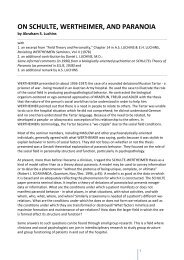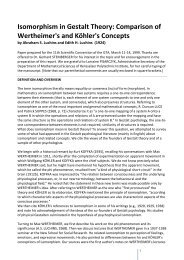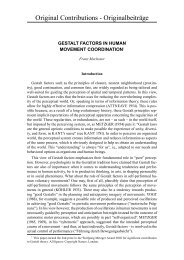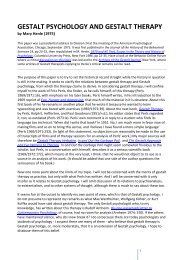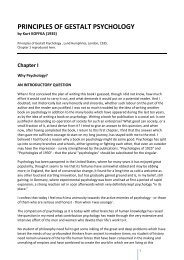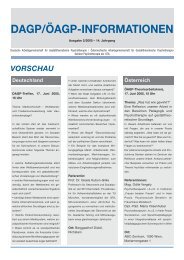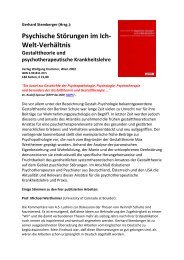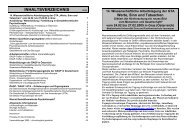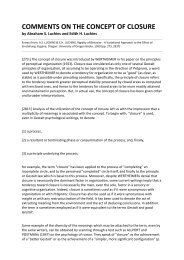pdf-Download - Society for Gestalt Theory and its Applications (GTA)
pdf-Download - Society for Gestalt Theory and its Applications (GTA)
pdf-Download - Society for Gestalt Theory and its Applications (GTA)
You also want an ePaper? Increase the reach of your titles
YUMPU automatically turns print PDFs into web optimized ePapers that Google loves.
the ego-core can lead to different states of consciousness. Relatedly, DITTRICH (1985) argues, onthe basis of factor analysis of numerous experiments, that there are only three main dimensions(independently of pharmacological <strong>and</strong> psychological causes) within the various <strong>for</strong>ms of alteredstates of consciousness:1. Oceanic self boundlessness;2. Anxious ego dissolution; <strong>and</strong>3. Visionary restructuring.As a rule, only hallucinatory events take place during a lucid dream. Whether the vanishing of theego is accompanied by peak experiences of type 1, or unpleasant, fearful experiences of type 2depends, above all, on the subject's epistemological point of view <strong>and</strong> the emotional attitudeflowing from it. Otherwise, we see no decisive difference between these <strong>for</strong>ms of experience.Those of the first type were the only ones encountered by our experienced lucid dreamers whocarried out the experiments without any anxiety or fear. They can sometimes be described ascosmic experiences with a holographic structure in which the self <strong>and</strong> the (phenomenal) cosmos<strong>for</strong>m a single unit.The Evolution of ConsciousnessA series of phenomenologically differentiated experiences can be distinguished in which theopposition of the ego (or self) to the world is eliminated. This is discussed in chapter 10, "TheEvolving Soul," of GACKENBACH <strong>and</strong> BOSVELDs Control Your Dreams (1989).We are of the opinion that such peak experiences, above all in the Indian culture <strong>and</strong> subsequentlyin many western cultures, are too dependent on meditation techniques <strong>and</strong> frequently lead to apassive condition marked by withdrawal from the world. But similar states can also be reachedwhile physiologically awake. Numerous Japanese Zen Buddhists, whose outlook is close to German<strong>Gestalt</strong> theory, are able to reach such states of consciousness by means of the "outer way"; <strong>for</strong>example, through artistic or physical exercises. Zen Buddhist philosophers (see IZUTSU, 1986, p.35) also speak of a "supra-consciousness." In both Zen Buddhism <strong>and</strong> <strong>Gestalt</strong> theory (which is <strong>its</strong>elfsupported by countless empirical investigations), the vanishing of the ego (or at least <strong>its</strong> recedinginto the background) is the most important prerequisite <strong>for</strong> unprejudiced perception, productivethinking, free <strong>and</strong> creative action. Given, however, that we adopt an egocentric attitude as part ofgrowing up in our western culture, the road to creative freedom is not easy. By eliminating certainimpediments in the <strong>for</strong>m of psychological resistance or defense mechanisms, lucid dreaming canprovide a key to the successful traversing of this road (<strong>for</strong> details see THOLEY, 1989c). It is notpossible to describe this road in more detail within the context of this article; nor the many diverseapplications which we have only been able to touch upon.In conclusion we would like to point out that reaching creative freedom in perception, thinking,<strong>and</strong> artistic or scientific activity, shares a similarity to "enlightening" or "waking up" from therobot-like sleep of our day to day existence as described by TART (1986). But we are also of theopinion that there is a lot of investigative work remaining. We have merely made a singleexcursion from which it is only possible to point out new research perspectives, rather than reportfinal conclusions.14



